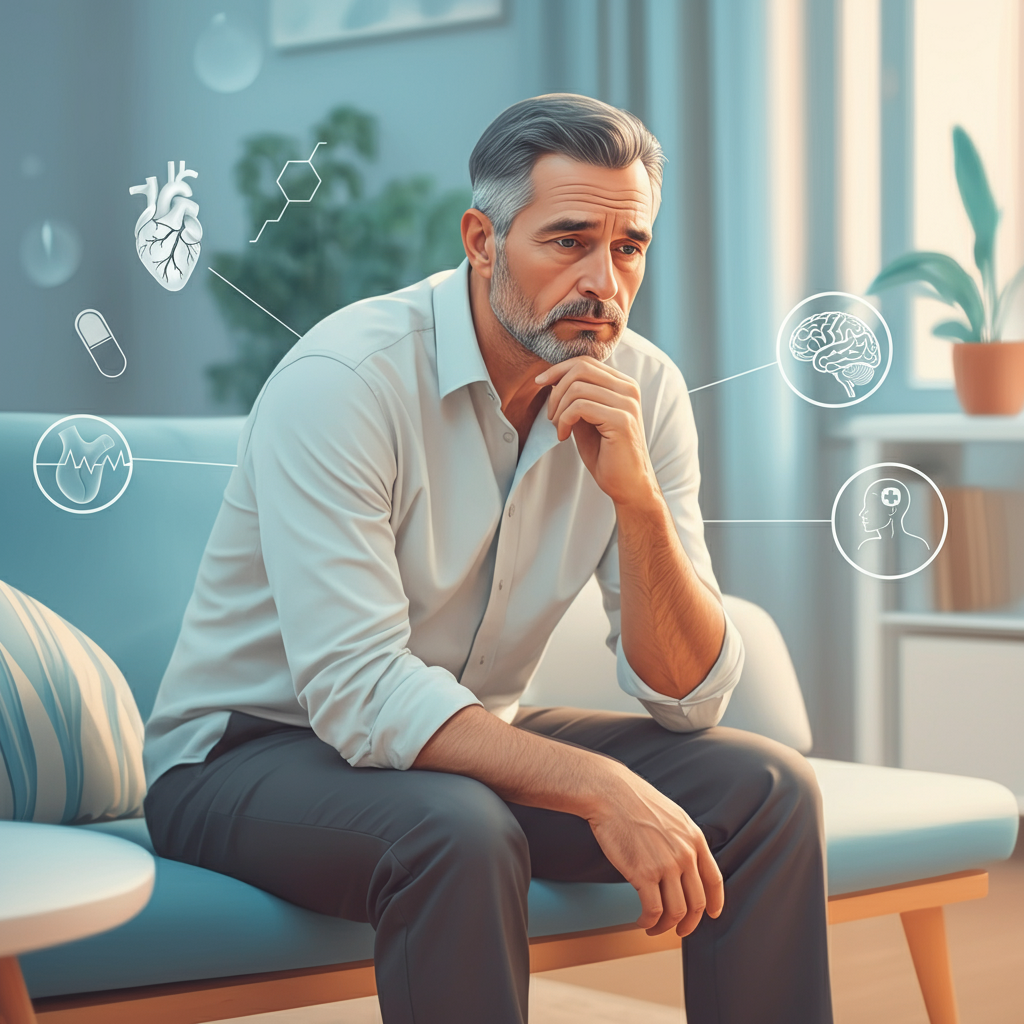When it comes to health issues, it can seem lonely, especially when the subject is personal, like erectile dysfunction (ED). It is important to realize that you’re not alone. Men from all walks of life suffer from this problem, and engaging in a conversation with them can be the very first move towards being aware of and managing the issue. This guide will give a straightforward, easy, and comforting look at erectile dysfunction. It will cover the causes, symptoms, as well as the various efficient treatments that are currently available. Let’s discuss it.
What Exactly Is Erectile Dysfunction?
In the first place, let’s clarify what we’re talking about. Erectile dysfunction refers to the persistent inability to maintain or get an erection strong enough for sexual intimacy. It is important to remember the term “consistent.” The feeling of having trouble with your irregular erection doesn’t have to be a reason to be concerned. Stress or fatigue, or excessive alcohol consumption, can trigger a temporary effect. ED is, in contrast, a chronic issue that could seriously affect your self-esteem as well as your relationships.

Knowing this distinction is essential as it can help to understand the disease. It isn’t a reflection of your sexuality or masculinity skills; it’s a medical condition that has underlying causes like other health issues. Being aware of this lets us get past any fears of shame and towards finding efficient solutions.
Unpacking Erectile Dysfunction Causes
The process of getting an erection is extremely complicated, and involves hormonal systems, the brain, emotions and nerves, muscles, as well as blood vessels. Therefore, a problem with any of these may result in ED. The reasons for this are usually multifaceted and can be classified into two types: psychological and physical.
Physical Causes of ED
The majority of the time, Erectile dysfunction is the result of an illness. This is especially the case for older men. Here are a few most frequently reported physical causes:
- Heart Disease and Vascular issues: Healthy blood flow is crucial for an erection. Thus, issues that affect the blood vessels and heart are among the leading to erectile dysfunction. dysfunction.. Atherosclerosis (clogged blood vessels) and elevated blood pressure, as well as high cholesterol, all can hinder circulation to the penis. In reality, ED can sometimes be an early indicator of a heart disease that is underlying.
- diabetes: Over time, it can cause damage to the blood vessels and nerves that regulate erections, making it a major risk factor for ED.
- Obesity: Being overweight can be a contributing factor to a variety of other physical conditions, such as diabetes and heart disease. Additionally, it may result in hormonal imbalances that can affect sexual health.
- Hormonal Inbalances: A low testosterone level is well-known as a cause of lower sexual desire, but it can be a contributing factor to ED. In the same way, other hormonal issues, like thyroid issues, may play a part.
- Neurological disorders: Conditions like Parkinson’s Disease, MS, and spinal cord injuries may hinder the nerve signals that travel through the brain to the penis, hindering sexual erection.
- Certain medications: A surprising number of prescription medications could cause ED as an adverse side effect. This includes certain antidepressants, as well as blood pressure medications and antihistamines.
Psychological Causes of ED
The mind plays a significant part in the process of sexual stimulation. This is why psychological factors can cause or exacerbate Erectile dysfunction.
- The stressors and anxiety: Everyday stress due to work, finances, or relationships can cause a person to be unable to be energized. The fear of performance anxiety or the anxiety that you won’t be able to achieve an erection can lead to an unsatisfactory cycle in which the anxiety itself is the main source of the issue.
- Depression: A common mental health issue profoundly impacts every aspect of one’s life, including their sex drive and the ability to have sexual experiences.
- Relationship problems: Issues with the partner, insufficient communication, or unresolved disputes could cause stress and absence of intimacy that can contribute to the development of ED.
Recognizing the ED Symptoms
The most prominent sign of erectile dysfunction is, naturally, the inability to achieve or keep an erection. However, symptoms of ED may also be a result of:
- Reducing Sexual Desire: Although ED can be mostly about erections, it can also be related to lower sexual desire or a lack of desire to have sex. It could be the cause of either a symptom or a cause or both.
- Problems in Getting the erection you want: It is possible to discover that it takes a longer time or more stimulation to become erect.
- Problems Maintaining An Erection: There is a chance of getting an erection; however, you will find it’s not lasting long enough to be satisfying.

If you’ve experienced one of these symptoms continuously for more than three months, it’s best to talk with a healthcare professional. They will help you identify the root of the problem and recommend the best course of action.
Exploring Treatment for Erectile Dysfunction
The positive side is that there’s an array of highly efficient options for the treatment of Erectile dysfunction. The most effective treatment is based on the nature and severity of your problem.
Lifestyle Modifications
For most males, the initial and least invasive treatment option is to make positive lifestyle adjustments. These modifications can boost general health and consequently improve erectile function.
- Regular exercise: Physical activity increases blood flow, aids in weight control, and eases stress.
- Consume a healthy Food Plan: A diet filled with fruits, vegetables, whole grains, and lean proteins can improve your cardiovascular system, which is crucial for sexual erections.
- Stop smoking: Smoking damages blood vessels and can severely limit blood flow throughout the body, including the penis. It is among the most beneficial things you can do to improve your erectile health.
- Limit the intake of alcohol: Excessive alcohol consumption may affect the erectile system in both the short and long term.
- Manage stress: Find healthy methods to manage stress, like yoga, mindfulness, or even hobbies are a great way to have a positive effect.
Medical Treatments
If your lifestyle changes aren’t sufficient to make a difference, your doctor might suggest medical intervention.
- Oral Meds: Drugs like sildenafil (Viagra), Tadalafil (Cialis), and Vardenafil (Levitra) are usually the first-line treatment for medical conditions. They function by increasing penis blood flow as a response to sexual stimulation.
- Testing for testosterone: If testosterone deficiency is determined to be the cause, treatment with hormone replacement therapy may assist in the restoration of libido and erectile capacity.
- Other Alternatives: For men who can’t take oral medications, Other treatments are also readily available. This includes injections that are self-injected into the penis to induce an erection, vacuum devices for erections, which draw blood to the penis, as well as, in more serious cases, implants in the penile.
Counseling and Therapy
If mental factors are the main factor, or ED causes distress for the person, counseling is a great option. A therapist can help tackle issues related to anxiety, stress, or depression. Couples therapy can be an excellent way to enhance the relationship between you and your partner.

The condition of Erectile Dysfunction can be described as a typical medical condition that is not a personal flaw. If you are aware of its causes and symptoms, you can control your health. It starts with a conversation, whether with your partner or, most importantly, with a health professional. If you have the right guidance and treatment program, you can manage ED and live a healthy and fulfilling sexual life. Always remember that seeking assistance is a sign of confidence and that there are solutions available.





